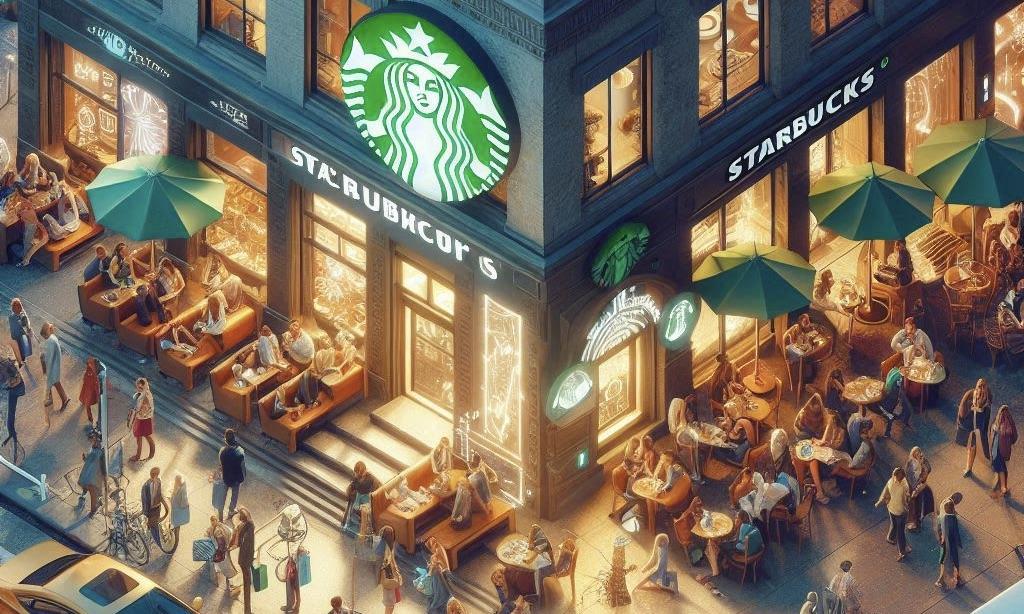Starbucks reported a 1% revenue decline from April to June, attributing the drop to reduced consumer traffic in the United States and China. CEO Laxman Narasimhan remains optimistic, citing new products and efficiency improvements to drive future growth.
Starbucks Revenue Falls 1% Amid Reduced Traffic in US and China; New Strategies to Boost Future Growth
Starbucks' revenue decreased by 1% from April to June due to reduced consumer traffic in the United States and China.
However, the Seattle coffee giant expressed confidence on July 30 that its next fiscal year, which commences later this autumn, will be able to reverse the situation by implementing successful new products and enhancements in efficiency, such as faster drive-thru service and improved equipment.
“We are focused on what we can control in a consumer environment that can best be described as ‘complex,'” Starbucks CEO Laxman Narasimhan said during a conference call with investors.
According to Narasimhan, consumers in numerous markets have become more prudent in their expenditures and are confined to their homes. Starbucks' remarks were consistent with McDonald's, which disclosed earlier this week that its same-store sales experienced a 1% decline in April-June.
Starbucks' same-store sales, which refer to sales at locations that have been operational for at least one year, experienced a 3% decline. According to analysts surveyed by FactSet, this was marginally higher than the 2.7% decline that Wall Street had anticipated.
Starbucks Sees 14% Sales Drop in China Amid Competition; Explores Strategic Partnerships to Boost Growth
According to ABC News report, Starbucks experienced a 14% decline in same-store sales in China, facing competition from lower-priced competitors. According to Starbucks, Chinese consumers visit less frequently and spend less per visit.
Narasimhan stated that Starbucks continues to perceive substantial potential in China, its second-largest market, with 6,500 stores. However, he noted that the organization is investigating a strategic partnership or joint venture in China that could accelerate its expansion. Additionally, such an alliance could mitigate Starbucks' vulnerability to market fluctuations.
“What we want to be sure of is that we are further strengthening our advantage in this market because the long-term opportunity for us is significant,” he said.
Same-store sales declined 2% in the United States. Starbucks reported that increased expenditures per visit partially mitigated a 6% decrease in traffic.
Narasimhan stated that the United States had a few promising areas. The company's new Summer-Berry Refresher, which features raspberry pearls that resemble boba, achieved the highest first-week sales for a new product in the company's history. During the quarter, Starbucks also observed a 7% increase in loyalty members in the United States.
However, Narasimhan stated that the organization must improve its supply chain and increase daytime sales. According to him, the Summer Berry Refresher was so well-received that the company was compelled to reduce its marketing efforts due to a shortage of ingredients. Starbucks also needs help maintaining its culinary inventory.
Narasimhan said Starbucks also still faces boycotts of its stores in the Middle East, Southeast Asia, and parts of Europe for its perceived support of Israel in the war in Gaza.
Starbucks' fiscal third quarter revenue was $9.1 billion. Analysts polled by FactSet said this was less than the $9.2 billion Wall Street had anticipated. Net income decreased by 7.6% to $1.05 billion, or 93 cents per share, consistent with analysts' predictions.
Narasimhan has verified recent allegations that activist investor Elliott Investment Management has acquired a stake in the company.
“Our conversations to date have been constructive,” he said.
Starbucks shares rose 3% in after-hours trading on July 30. The stock has fallen 25% in the last 12 months.



 Pentagon Weighs Supply Chain Risk Designation for Anthropic Over Claude AI Use
Pentagon Weighs Supply Chain Risk Designation for Anthropic Over Claude AI Use  APEX Tech Acquisition Inc. Raises $111.97 Million in NYSE IPO Under Ticker TRADU
APEX Tech Acquisition Inc. Raises $111.97 Million in NYSE IPO Under Ticker TRADU  Trump Media Weighs Truth Social Spin-Off Amid $6B Fusion Energy Pivot
Trump Media Weighs Truth Social Spin-Off Amid $6B Fusion Energy Pivot  Coupang Reports Q4 Loss After Data Breach, Revenue Misses Estimates
Coupang Reports Q4 Loss After Data Breach, Revenue Misses Estimates  Lynas Rare Earths Shares Surge on Strong Half-Year Earnings and Rising Global Demand
Lynas Rare Earths Shares Surge on Strong Half-Year Earnings and Rising Global Demand  Trump Orders Federal Agencies to Halt Use of Anthropic AI Technology
Trump Orders Federal Agencies to Halt Use of Anthropic AI Technology  Amazon’s $50B OpenAI Investment Tied to AGI Milestone and IPO Plans
Amazon’s $50B OpenAI Investment Tied to AGI Milestone and IPO Plans  Meta Signs Multi-Billion Dollar AI Chip Deal With Google to Power Next-Gen AI Models
Meta Signs Multi-Billion Dollar AI Chip Deal With Google to Power Next-Gen AI Models  FAA Plans Flight Reductions at Chicago O’Hare as Airlines Ramp Up Summer Schedules
FAA Plans Flight Reductions at Chicago O’Hare as Airlines Ramp Up Summer Schedules  Netflix Declines to Raise Bid for Warner Bros. Discovery Amid Competing Paramount Skydance Offer
Netflix Declines to Raise Bid for Warner Bros. Discovery Amid Competing Paramount Skydance Offer  Toyota Plans $19 Billion Share Sale in Major Corporate Governance Reform Move
Toyota Plans $19 Billion Share Sale in Major Corporate Governance Reform Move  FCC Approves Charter Communications’ $34.5 Billion Acquisition of Cox Communications
FCC Approves Charter Communications’ $34.5 Billion Acquisition of Cox Communications  Paramount Skydance to Acquire Warner Bros Discovery in $110 Billion Media Mega-Deal
Paramount Skydance to Acquire Warner Bros Discovery in $110 Billion Media Mega-Deal  Nintendo Share Sale: MUFG and Bank of Kyoto to Sell Stakes in Strategic Unwinding
Nintendo Share Sale: MUFG and Bank of Kyoto to Sell Stakes in Strategic Unwinding  Boeing Secures $166.8 Million U.S. Navy Contract for P-8A Engineering and Software Support
Boeing Secures $166.8 Million U.S. Navy Contract for P-8A Engineering and Software Support  Snowflake Forecasts Strong Fiscal 2027 Revenue Growth as Enterprise AI Demand Surges
Snowflake Forecasts Strong Fiscal 2027 Revenue Growth as Enterprise AI Demand Surges 































